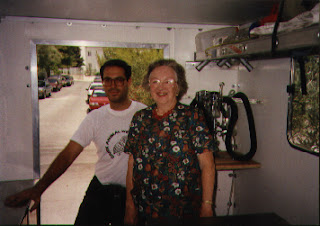 Communication is a vital part of our work at GAWF/Animal Action and, as we have all been told a thousand times, a picture is worth a thousand words. So on a rather grey October afternoon I took to the streets around my home in Athens in search of the many stray cats that live in our neighbourhood. There are so many, and I thought it would be easy to photograph some of them so that we can have some recent images to use in promoting our work.
Communication is a vital part of our work at GAWF/Animal Action and, as we have all been told a thousand times, a picture is worth a thousand words. So on a rather grey October afternoon I took to the streets around my home in Athens in search of the many stray cats that live in our neighbourhood. There are so many, and I thought it would be easy to photograph some of them so that we can have some recent images to use in promoting our work. 
A few metres down my road there is a diving equipment shop. Its owner, Ali, is a daily feeder of our neighbourhood strays so they often hang out nearby, waiting for him to appear. I caught sight of some of his “regulars” clustered around the huge rubbish bin on the street corner, sniffing around for scraps. Most of them took off but one stayed as it was busy licking something nasty out of a crumpled bit of aluminium foil. As I approached, camera in hand, it glared at me and, deciding I was clearly taking an altogether unwarranted interest in its activities, slunk off to keep an eye on me from under a parked car. I waited, but although it emerged eventually, it had rumbled me and kept its distance. Cats 3: Anna 0

My next targets were gathered in a side street close to the new Acropolis Museum. There was an old yogurt pot with clean water in it in a doorway and I assumed someone was feeding the three sleepy-eyed customers that didn’t seem too phased by my presence. One jumped onto a car and even allowed me to tickle its ears but, as soon as the camera came out it scarpered and re-joined the other two, regarding me from a distance that would be enough to provide me with only the most boring of images. Cats 6: Anna 0
I was saved from utter humiliation by the appearance of Eleni Kefalogianni and her bulging carrier bag. Eleni lives locally and is a pillar of Nine Lives – a very active group of cat lovers, feeders and carers who, as she told me as I joined her on her feeding round, daily feed about 120 stray cats in central Athens, almost all of which the organisation has also neutered. I felt proud that GAWF/Animal Action has from time to time been able to support them in their work – particularly in the neutering aspect of it.
As soon as Eleni appeared, secret signals swept through the area and cats began to appear. They honey-poured themselves over walls and parapets; tooth-pasted themselves out from under cars; Light Brigade charged full pelt up the hill; materialised out of thin air. They all looked healthy, well fed and the majority had a snip out of one ear that said “I’m neutered”. They queued, quarrelled, wove through railings and followed Eleni on her round. They refused to stand still and be photographed; they refused to look into the lens. Cats 117 (approx.): Anna about 9



.jpg)


.jpg)























